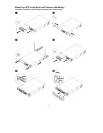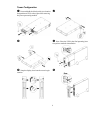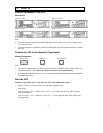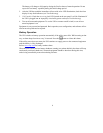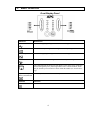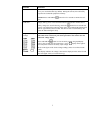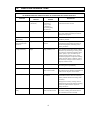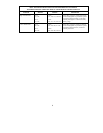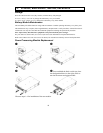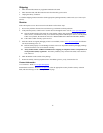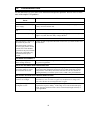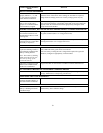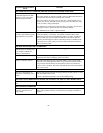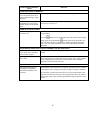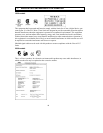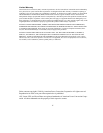
13
PROBLEM AND/OR POSSIBLE
C
AUSE
S
OLUTION
NOT ALL OUTLETS ARE POWERED
One or more of the outlet
groups (labeled ‘1’, ‘2’, and
‘3’) are shut off via the net-
work interface connection.
Access the UPS control panel via the network interface connection and
check the status of the outlets. If the settings are not what are expected,
change them accordingly and review security settings (password, etc.).
3000 VA, 120 V model only:
One or more of the outlet
groups are overloaded and the
circuit breaker(s) tripped.
The three outlet groups are individually protected by circuit breakers, in
some cases lower than the overall limit of the UPS. If any one of these has
tripped, reduce the load and/or distribute appropriately among the outlet
groups and reset the breaker.
RUNTIME IS SUFFICIENT, BUT THE LOW BATTERY WARNING INTERVAL IS LONGER THAN EXPECTED
The UPS perceives there are
fewer batteries than are con-
nected and provides too much
warning time.
Configure the UPS via PowerChute to register the number of external bat-
tery packs connected (See User Configurable Items).
The configured low battery
warning interval is longer than
necessary or expected.
Configure the UPS via PowerChute
to provide an adequate low battery
warning interval (See User Configurable Items).
THE LEDS IN THE BATTERY BAR GRAPH ARE BLINKING TOGETHER
While online or on battery, the
expected remaining runtime is
lower than the configured low
battery warning interval.
Note: The number of blinking
LEDs still indicates the rela-
tive state of charge of the
connected batteries.
If the runtime is too short for a graceful shutdown of the connected equip-
ment, additional battery packs must be connected.
If the low battery warning interval is longer than required for a graceful
shutdown, configure it appropriately via PowerChute.
The battery runtime meter has
fallen out of calibration and
needs to be recalibrated.
Program the UPS via PowerChute to conduct a runtime calibration test.
ALL LEDS ARE ILLUMINATED AND THE UPS EMITS A CONSTANT BEEPING
Internal UPS fault. Do not attempt to use the UPS. Replace the power processing module (See
Storage, Maintenance, Transporting, and Service).
FRONT PANEL LEDS FLASH SEQUENTIALLY
The UPS has been shut down
remotely through software or
network interface connection.
None. The UPS will restart automatically when utility power returns.
ALL LEDS ARE OFF AND THE UPS IS PLUGGED INTO A WALL OUTLET
The UPS is shut down or the
battery is discharged from an
extended outage.
None. The UPS will return to normal operation when the power is restored
and the battery has a sufficient charge.



